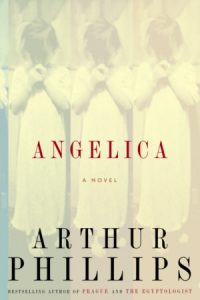The Story Behind the Book
I.

The moment it happens feels inexplicable, as though he’s performed an exceptional sleight-of-paw. Only years later can I make out how he did the trick, the cards he had to work with, my state of mind in the weeks before the critical walk.
I recall now I had been thinking about fear and children.
II.
Children believe—with both pride and resentment—that fear is their monopoly. Darkness, evil, murderers, ghosts: kids feel that adults don’t seem to notice these things, or aren’t frightened by them (perhaps, the bed-bound child suspects, because they are in league with them). As their fed-up parents close the door with a firm “That’s enough now,” and darkness returns, children live alone with fear.
Then, one day, the adult, having grown up and closed the door on his old nursery terrors, has children of his own, and only then does he discover (or re-discover) the excruciating, physical fear produced by anxiety and imagination. As a parent he feels once again that same pride and resentment: now he has the monopoly on fear, for he is certain that no child could know the toe-curling, nauseating terror of speculating on the myriad ways one’s own child can be hurt, corrupted, maimed, killed. Becoming a parent means learning to wrestle again with multi-limbed fear.
In some situations, parent and child can set each other off, inadvertently proving to the other that their worst worries may be justified. Somehow that idea caught my attention: a psychological perpetual motion machine—fear itself breeding a ghost, rather than vice versa.
III.
Ghost stories—not the published or filmed variety, but the kind where a friend mentions one night over drinks, “Well, you know, I actually saw a ghost once”—have a few elements in common: the haunting was probably not recent; the story’s climax is not so much a description of the phantom as of the human feelings inspired by it; the encounter ended without much lasting effect on the mortal, other than a cool willingness to believe in the supernatural from that point on, with no more hesitation than believing in invisible air. And, finally, in my experience, the witness has a pronounced tendency to be female.
But let’s take away from that woman the coolness, the confidence, the drink, the willing listener. Isolate her just slightly, and add to her experience her child’s natural or unnatural fear. Now she sees a ghost, but not a benevolent, distant wisp, or a shimmering sensation in a darkened room. Instead, the visitor is recurrent and bold, visible and vile. It has perverse desire and intent to harm. It floats just above her sleeping child, and flees when the mother surprises it. It seems both familiar and menacing.
The woman is surrounded by men willing to laugh at her, but none who will listen, no outlet for a calming chat. She has no one to help her, and night after night the specter hovers closer and closer to her daughter, until the child begins to complain of mysterious pains, pains that imply a horrifying violation. Let us say that all of this occurs before neuroscience, before Prozac, before Freud, before the near-total triumph of the mental health empire we have now. In such circumstances, the lonely, frightened woman might have only one hope: the spiritualist.
IV.
Once, we knew that ghosts wandered among us; the new technology of photography appeared to prove it, as did séances and other practices of “scientific spiritualism.” For the haunted, or the emotionally troubled, or merely the lonely, the spiritualist served a function very similar to that now performed by the psychotherapist. Wiping the ectoplasm aside, the psychic, like the psychologist, aimed to ease anxiety and emotional suffering by listening. In practice, much of Victorian spiritualism resembled the talking cure, although the client was unburdening herself to the dead.
“Haunting can emerge from the forgotten depths of our own past, and assume physical and externalized form, now independent of the memories that spawned it. Memory and ghost are not so easily distinguished as previous generations have assumed.” So wrote Sir Everett d’Oyly in 1889, when you could be both a spiritualist and a psychologist. Even in 1999, the Harvard psychiatrist John Mack said of his UFO-abductee patients, “What if we were to acknowledge that the phenomenon is beyond our present framework of knowledge?… [Abduction] is of great importance to our evolution, regardless of its ontological status.”
That difficulty in distinguishing ghost from memory, alien abduction from human trauma, that confounding sense of the subconscious as a Thames fog of mingled and muddled dream, wish, memory, and fear, twisted and shifting… that uncertainty, too, was much on my mind. The unreliability of recollection, of perception, of history, of honesty, of character, and of narrators continues to fascinate me; I find it difficult to see the world in any other light any more.
Not coincidentally, of all the ghost stories I have read, it is the wavering, unsteady ones that alarmed me the most, the tales of perhaps nothing at all, that left me biting my lip. The fear of the child, the fear for the child, and the fear that perhaps there is nothing to fear but one’s own mind: these elements were all churning together, I suspect, before I took my trickster-dog for a walk.
V.
It is early afternoon and I am walking my beagle. I am recalling the night before with my wife, which culminated in marital intimacies of a not unconventional variety. A moment later during the walk, I think of our elder son and remind myself that he wants to play baseball with me this evening. He has mentioned it several times, in that way that demonstrates little faith in the memory of grown-ups, for perhaps they forget things as easily as he does.
Suddenly, a synaptic lightning bolt connects two formerly disconnected streams of thought: I am glad he did not come into our room last night to pester me about the baseball when my wife and I were engaged in the primal act. That would have been awkward. We haven’t yet faced awkward questions on that topic from him. I recall asking my own parents those questions when I was his age, perhaps a little older. I remember, at about his age, the primal sounds—once, perhaps twice—of my own parents. At this moment my dog stops to sniff something, jerks the leash, and I pull back too hurriedly. I am suddenly irrationally impatient, even angry. Why? Nothing has happened; I am not late; we are out here precisely so he can sniff things, but I feel suddenly troubled.
And then my mind dives down, farther, leaving behind the reasonably well-lit layer of things that have happened, past the darker blue of things recalled, the dim navy realm of things feared, possible but unreal, and now finally it swims in the unlit, angler-fish depths of things only imagined: what if my daughter reported, the morning after I had made love to my wife, that she, my little daughter, was suffering from a particular discomfort or pain precisely related to what she would have felt had she been in my wife’s place? What would I do? What would my wife believe and what would she think and how might it alter her view of me and of what we had done? What will we do if our daughter repeats her complaints, more precisely suggesting the presence of a third party?
Quickly now, we should swim back to the surface, even if we get the bends: I have no daughter, but I have just felt Angelica’s first kicks. What sort of man daydreams like that? My wife will, in the course of my composition of Angelica, ask me that question more than once. I can only reply, “A novelist.”

